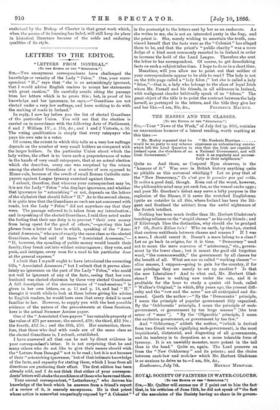LETTERS TO THE EDITOR.
"LETTERS FROM DONEGAL."
ITO THE Burma OP THE "SPECTATOR."]
Sre,—Two anonymous correspondents have challenged the knowledge or veraoity of the Lady "Felon." One, your corre- spondent "H.," says that "she is so astonishingly ignorant, that I would advise English readers to accept her statements with great caution." He carefully avoids citing the passage from her letters which is to prove this ; but, in proof of his knowledge and her ignorance, he says,—" Guardians are not elected under a very low suffrage, and have nothing to do with the making of roads in Ireland."
In reply, I now lay before you the list of elected Guardians of the particular -Union. You will see that the election, is carried on in accordance with the following Acts of Parliament, 6 and 7 William IV., c. 116, ifzc., and 1 and 2 Victoria, c. 56. The voting qualification is simply that every ratepayer who pays his own rate is a voter.
Of course, the extent to which this tells as a very low suffrage depends on the number of very small holders as compared with the larger holders. In the particular -Union about which the lady writes, the effect is to leave such a preponderance of votes in the hands of very small ratepayers, that at an actual election which she describes, every one was surprised by the return among the elected Guardians of a number of men opposed to Home-rule, because of the revolt of small Roman Catholic rate- payers against League tyranny exercised against them.
I submit, therefore, that whoever your correspondent may be, it is not the Lady" Felon" who displays ignorance, and whether that ignorance be " astonishing " or not, depends on the letters of the alphabet that should follow " H." As to the second clause, it is quite true that the Guardians as such are not concerned with roads, but the Lady " Felon " did not anywhere say that they were. The passage referred to is taken from my introduction ; and in speaking of the elected Guardians, I said they acted under the feeling that their one duty is to prevent " their own money from being spent for the good of others,"—quoting this last phrase from a letter of hers in which, speaking of the "Asso- ciated Assessors," who are of exactly the same class as the.elected Guardians, she had said of these "Associated Assessors,"— " If, however, the spending of public money would benefit their family, they break out into wildest extravagance ; they vote, and push, and intrigue, every man for a road to his particular door at the general expense."
I admit that I myself ought to have introduced the correcting title, "Associated Assessors ;" but I submit that it proves abso- lutely no ignorance on the part of the Lady " Felon," who could not well be ignorant of any of the facts, seeing that her own husband was elected chairman by these very elected Guardians A full description of the circumstances of " road-sessions " is given in her own letters, on p. 13 and p. 14, and had "H." thought it worth while to look at them before giving his advice to English readers, he would have seen that every detail is most familiar to her. However, to supply you with the best possible evidence of the nature of the presentments at these Sessions, here is the actual Summer Assizes paper.
One of the "Associated Cesspayers "has rateable property of the value of 271 per annum; the second, £18; the third, EN 10s.; the fourth, £12 5s.; and the fifth, £10. Her contention, there- fore, that those who deal with roads are of the same class as the elected Guardians is, I submit, established.
I have answered all that can be met by direct evidence in your correspondent's letter. It is not surprising that he and many others who do not like to give their names should wish the" Letters from Donegal" not to be read ; but it is not because of their "astonishing ignorance, 'but of that intimate knowledge of the facts, and capacity for stating them, which I hear from all directions are producing their effect The first edition has been already sold, and I do not think that either of your correspon- dents' letters will shake the confidence of those who have read them.
Your second correspondent, " Letterkenny," who derives his knowledge of the book which he answers from a friend's report of a review of it, is scarcely anonymous. He is that priest whose action is somewhat unsparingly exposed by" A Colonist"
in the postscript to the letters sent by her as an enclosure. As she writes to me, she is not an interested party in the fray, and the priest is. She, merely wishing to ascertain the truth, con. vinced herself that the facts were as the " Colonist " has alleged them to be, and that the priest's "public charity " was a mere dodge of a kind most commonly resorted to in Ireland in order to increase the hold of the Land League. Therefore she sent the letter to her correspondent. Of course, to get demolishing facts on such a subject takes time. I hope to do so in a short time.
Meantime, will you allow me to point out that neither of your correspondents appear to be able to read ? The lady is not on the title-page called a "lady felon ;" but she is called a lady "felon,"—that is, a lady who belongs to the class of loyal Irish whom Mr. Parnell and his friends, in all addresses in Ireland,. with malignant slander habitually speak of as "felons." The great object of the title is to point the contrast between the lady herself, as portrayed in the letters, and the title they give her
















































 Previous page
Previous page